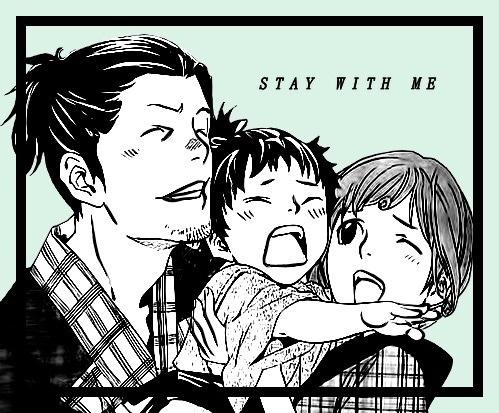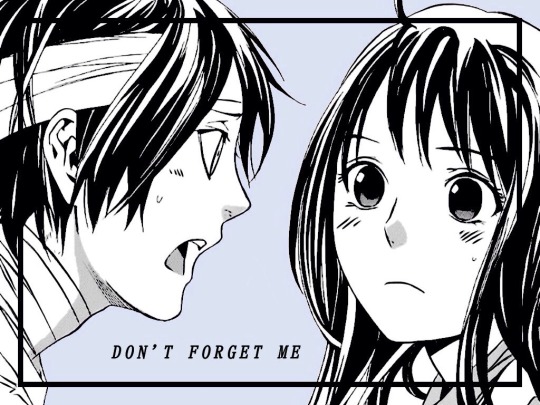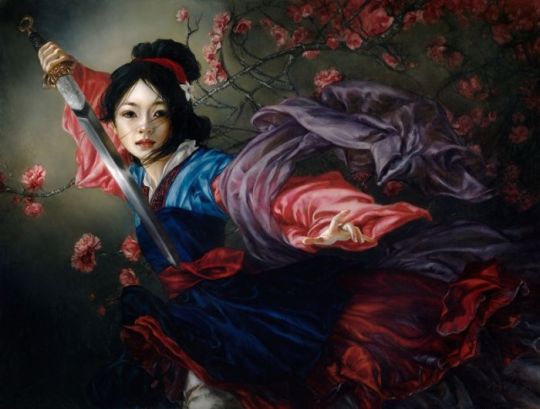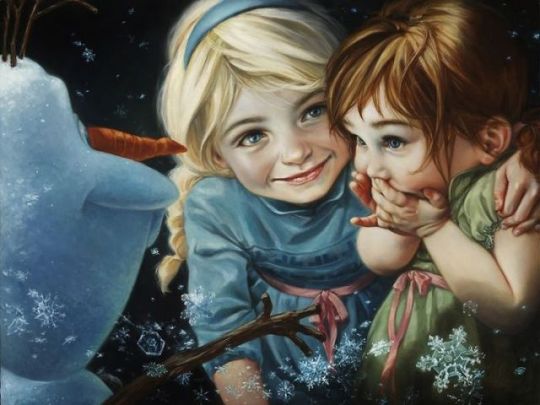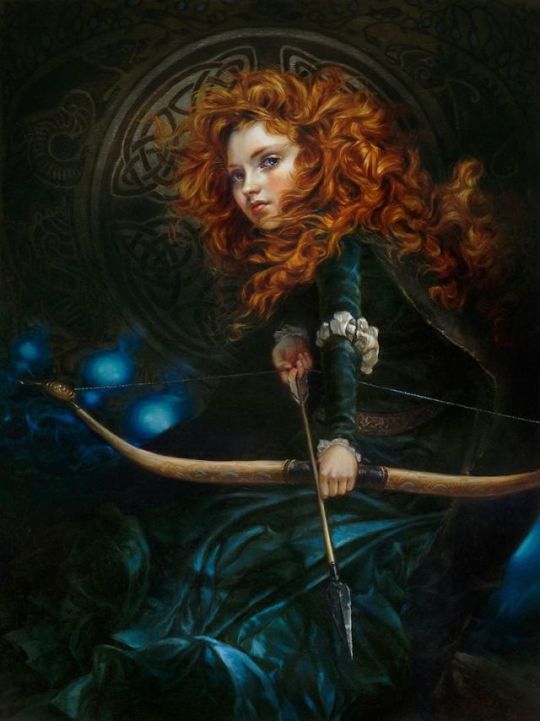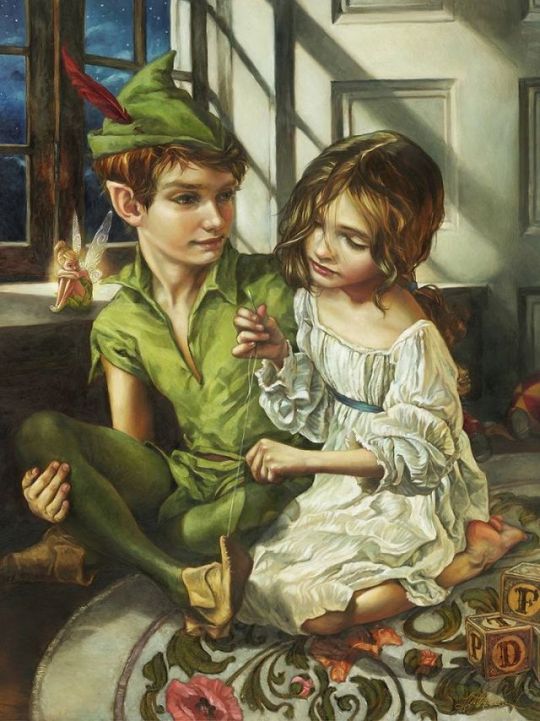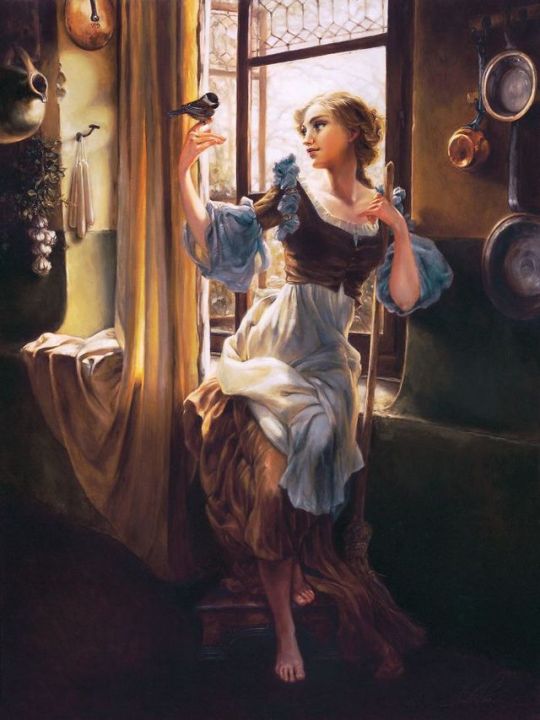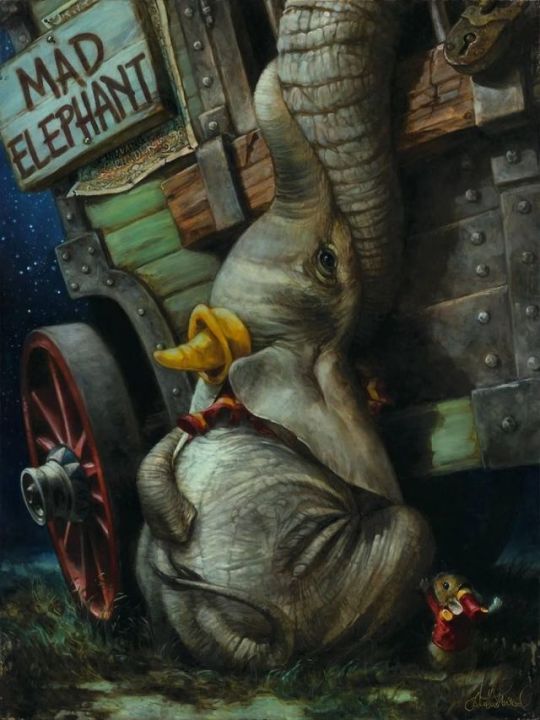Text
Many boys will bring you flowers. But some day you’ll meet a boy who will learn your favourite flower, your favourite song, your favourite sweet. And even if he’s too poor to give you any of them, it won’t matter because he will have taken the time to know you as no one else does. Only that boy earns your heart.
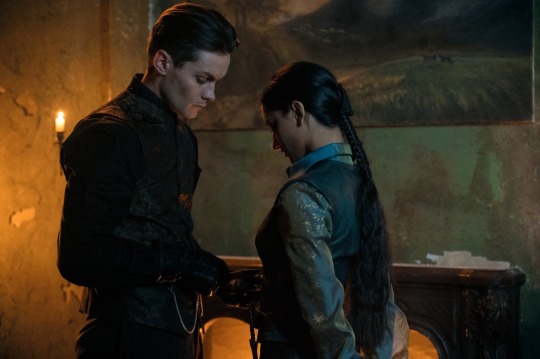
48 notes
·
View notes
Note
How do you know it’s thorn who responds at the end? I’m dying to understand your thought process.
I'm looking at the last official numbered page, when Ophelia is ostensibly speaking to herself: "because we're Mirror Visitors", she says aloud, referring to herself and Thorn.
The phrase "a little more than that, even" (which has been repeated by Thorn across the entire series and is, therefore, in a way representative of him) is the only thing that appears on the page after that one, effectively making this phrase the final words of the series.
So I'm choosing to interpret this as Thorn hearing her from the murky mirror world and responding to her:
“Because we’re Mirror Visitors,” she says.
“A little more than that, even,” he replies.
See?
I also think Ophelia tracking Thorn to Babel was foreshadowing for this moment. In her own way, she succeeds in what she swears she will do. By this point in the series, if she says she’s going to find Thorn and bring him back, well, I believe her.
27 notes
·
View notes
Text
OpheThorn IV: The End of Rambling
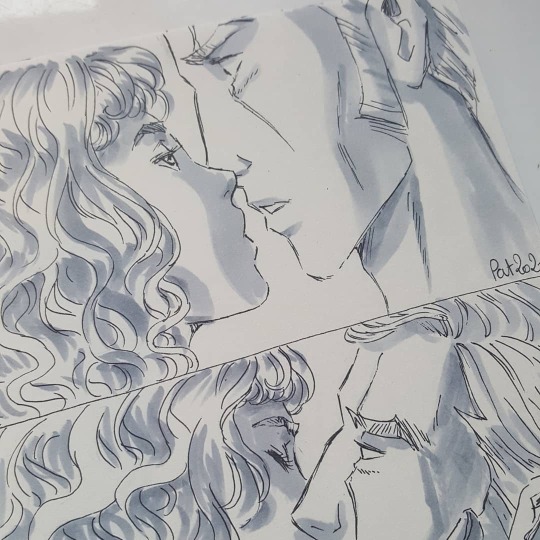
My, my, what a journey this series has been.
The Storm of Echoes left me with my jaw completely detached from my face. I admit that I didn’t know what was happening throughout most of the book. I will be conducting a re-read for sure at some point in the future. But as that may be a while and I’ve had some lovely people reach out to me for thoughts on this book, I wanted to conclude my OpheThorn series sooner rather than later.
Because the absolute honest truth is that I only have one thing to say about this beloved, beautiful, resilient, amazing couple.
[There will be a major spoiler]
[Fanart image credited to @patricialyfoung]
[For the series: OpheThorn I, OpheThorn II, OpheThorn III]
Everything you need to know about Ophelia and Thorn, as individuals and as a pair, has always been contained in those oft-spoken words. They are the final words of the series for a reason.
Within them, there is only the promise of possibility.
As she has done time and again, Ophelia found a way.
It doesn’t matter how or how long it took. What matters is that Thorn heard her.
He answered her.
A little more than that, even.
And they lived happily ever after.
~FIN~
Thank you for showing my ramblings all the love over the last few years! And if you were hoping for more insight, I encourage you to pick up the investigative thread. We could always do with more OpheThorn content!
#ophethorn#the mirror visitor#La Passe-Miroir#the storm of echoes#la tempête des échos#christelle dabos#slow burn romance#la passe miroir
187 notes
·
View notes
Text
OpheThorn III: Back to Rambling
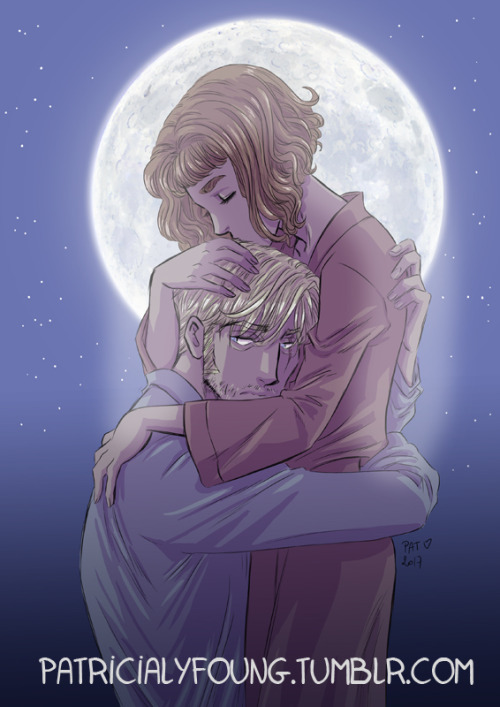
The Memory of Babel…Wow.
If nothing else, this book GOES. We’re dropped onto Babel just as lost, bewildered, and determined as Ophelia to get to the bottom of this ark. Boy, was it worth the wait! Babel is exquisitely written and, incredible as it sounds, even more treacherous than the Pole. The backbone Ophelia shows in this book is awesome! I love that she’s taken the measure of her worth—all the things she’s been through and survived in the previous novels—and come out resilient As Fuck. This book is definitely a penultimate novel. Dazzling as it is, much of it feels like groundwork being laid for the finale.
OpheThorn is less nuanced and ambiguous in Babel. While I feel there’s less to analyze, I do really love this pairing and I like writing about their dynamic. So, I’m just going to put my thoughts down and see what comes up!
[There will be spoilers]
[All fanart images credited to @patricialyfoung]
Intro
One of the things that drew me into The Mirror Visitor series is the relationship between Ophelia and Thorn. Theirs is not a traditional love story at all; in fact, it avoids clichés and instead plays about with two romantic tropes: enemies to lovers and marriage of convenience. The series spins these tropes anew by offering subtle signs of attraction (discussed here) and giving both characters antisocial tendencies, as well as—in Thorn’s case—possible ASD traits (discussed here).
When we left these two in Clairdelune, Thorn had just put his feelings on the table. Before she could give her response, however, they were separated under upsetting, even traumatic circumstances. Years later, we meet Ophelia again…
Ophelia
…and, oh dear, she is in a sorry state indeed. We find her disastrously operating a waffle stand during a kooky Animist festival for, of all things, clocks. Just what the girl pining for Thorn needs, right? All is not well with Ophelia. As Aunt Rosaline points out,
“No, you’re not fine. You don’t go out anymore, you eat any old thing, you sleep at any old time. You haven’t even been back to the museum.” [19]
Although her mother, sister, and to an extent Aunt Rosaline all believe Ophelia is wasting away, shutting herself in her room, she’s actually been quite busy. She’s been studying and developing working hypotheses about God and the Other: where they are, there she’ll find Thorn. She’s convinced of it. Working from obscure clues dropped in Clairdelune, Ophelia settles on Babel as the ark most likely to yield some answers, and when the chance to travel there appears, she wastes no time at all.
She. Is. Going.
Thorn
In Babel, Thorn has made a name for himself as Sir Henry, rising to become a Lord of LUX, the gatekeepers of Babel who serve a similar function to that of the Doyennes on Anima. He is commanding, magnetic, and aloof as ever. It is unsurprising to find that he has been playing close to the fire again. But the stress and tension of his investigative life on Babel is certainly heightened in a way that it wasn’t at the Pole.
We also learn that his nickname in Babel is the Automaton due to his unceasing energy. Thorn, thus, has dealt with the separation by predictably burying himself in work.
The Reunion
To Ophelia’s disappointment, the reunion with Thorn does not go quite as she had envisioned, and that’s because she hadn’t really envisioned past the goal of finding him [203]. Ophelia is very much a character who takes things one at a time as she’s confronted by them. When Thorn seems less than pleased to see her, she must consider all these Troublesome Feelings and why his underwhelming reaction upsets her.
The thing is Ophelia is waiting for Thorn to take the lead. But he already did, and she didn’t follow—at least, not in a way that he could understand. As previously discussed, Thorn does not function well with non-verbal cues. He needs to be explicitly told how someone else feels, or how he is making someone else feel, in order to know when to adjust his behavior. That can be quite flustering, especially for someone like Ophelia who struggles to vocalize her feelings exactly as they are.
“Is that it?” Ophelia murmured. “You have nothing more to say to me?”
“I have, actually,” Thorn muttered, not stopping all his connecting. […] “And you?” he finally asked, in turn. “You have nothing more to say to me?” [263]
She doesn’t. Thorn coldly dismisses her and continues to keep her at arm’s length, especially when he gives her a second chance to confess her feelings and she still refuses to take it.
Ophelia has social anxiety. She’s not exactly shy, she just gets tongue-tied and befuddled sometimes. It’s part of her make-up, but it doesn’t just happen around Thorn—there are plenty of instances where she has trouble expressing herself to those she cares about, such as Ambrose and Blaise in this novel, or Fox in Clairdelune. She even struggles to express basic gratitude toward Aunt Rosaline in Promise. Unlike them, Thorn challenges her to uncomfortable levels. Her feelings for him are complex and utterly foreign; she has no idea what to do about them.
Unfortunately, Thorn is fresh out of fucks to give over her see-saw act. He’s well-past this stage of confusion and cowardice she’s experiencing because he’s been in love with Ophelia since Promise (“I’m starting to get used to you”) and dealt with the ramifications of that in Clairdelune (“I don’t give a damn whether people find me suspect, as long as I am not so in your eyes.”).
Thorn does nothing half-heartedly. In no uncertain terms, he left her with the bluntest of blunt confessions (“By the way, I love you.”), which was a milestone in his emotional growth. It is clear that he does not love frivolously or casually in the way of his foil, Archibald, so for him, nothing has changed in three years. Likely, he thinks this should be obvious to Ophelia, and it probably should be at this point. He’s done all he can, after all, what more can she want? From his perspective, it’s Ophelia’s turn to make a move, not his.
Ophelia, though, functions differently. She has always needed verbal reinforcement and reassurance. That need has been heightened by their long separation. Essentially, they’re out of touch with one another and, in Ophelia’s case, she’s completely out of touch with herself, which is why when prompted by Thorn she doesn’t provide an answer, even though there could be only one reason for her going to Babel. Things finally come to a head when Thorn loses all patience and replaces her as his assistant. Ophelia is pissed.
“You weren’t available. Waiting for you would have slowed me down in my research.”
“Slowed you down? For your information, I was also doing research of my own. It might interest you to learn…”
“Of your own, that’s precisely the problem,” he interrupted her. “I advised you never to leave your division, and you were supposed to warn me if you discovered anything new. Nothing has changed, you still always make your decisions alone.”
“I wanted to help you,” Ophelia hissed, through gritted teeth.
“I don’t want any of your finer feelings. I need efficiency. If you don’t mind, I now have a flight to take.”
Ophelia’s blood ignited in her every vein. “You’re an egoist.” She had wanted to anger Thorn, and she knew, by the way he had frozen on the spot, that she had succeeded. All the shadows of the night suddenly seemed to have been drawn to the center of his face. He threw Ophelia a look so hard, she reeled from its impact.
“I am demanding, a killjoy, obsessive, antisocial, and crippled,” he intoned, in a forbidding voice. “You can put all the defects in the world on me, but I will not permit you to call me an egoist. If you prefer to do things your way, go ahead, but don’t waste my time anymore. Our collaboration is over.” [305]
OMG, this is harsh. But it’s the kick in the ass Ophelia needs. Since taking up a secret identity as Eulalia and aspiring to become a Forerunner (essentially a scholar and a scribe), she’s already been confronted by the fact that she’s not as good a researcher as she’s prided herself on. Now, she’s being confronted by the suggestion that she’s not a very good partner, either. It leaves her feeling “drier than dust.” [321]
I think it’s interesting how Thorn’s dialogue here has a double meaning. He’s talking about their partnership as an investigative team, of course. But it just as easily applies to their personal relationship. He can’t keep waiting around for Ophelia to make up her mind. He’s got a God to hunt down, an Other to face. Having to wonder about where he stands with Ophelia is getting to be too much. By once again haranguing off on her own, Ophelia has made it plain to him that she prefers to do things without him. In his eyes, she’s pushing him away.
Eventually, she is able to see this perspective and she is ashamed to realize how badly she’s held Thorn to a double standard. He gave of himself through words and gestures as far as he was able, while she gave him nothing in return. Finally, FINALLY, Ophelia fully expresses her love for Thorn and, as he once did, asks him to forgive her shortcomings. It’s a very sweet scene, I must say.
Now, to go back for a moment, what’s really gutting about Ophelia calling Thorn an egoist is this:
“God said he would keep his eyes on you,” he muttered, in a choked voice. “Right in front of me. I make a lamentable husband, but I permit no one, particularly him, to persecute my wife. It’s impossible for me to tear you away from God, but I can tear him away from you. If a book exists that contains God’s secret, and allows his invulnerability to be punctured, I will find it.” [392]
For context, Ophelia had admonished Thorn for his dogged pursuit of this quest, expressing outrage that he should be doing this for a world that’s done nothing for him. At one time, yes, Thorn may have been acting in the interest of the world. Then, he met Ophelia (who is too curious for her own good) and he met God. God threatened her, and Thorn is not a man who could allow such a thing to go unpunished, no matter the consequence. Ever since they met—through every consideration, every move in this impossible investigation and despite each rejection from her—he’s been acting out of love for Ophelia.
As Thorn said, he is not an egoist.
The Blind Spot
After their “egoist” argument, Ophelia feels instant regret and tries to stop Thorn from walking away. She doesn’t succeed, however, because she is struck by his claws. At first, she believes he may have done this on purpose, the thought of which really scares her because it indicates that Thorn is absolutely done with her.
Later, after she finally makes her confession, we all learn that, in fact, Thorn has lost a bit of control over his family power. He has no idea that he used his claws on Ophelia. I’m a little bit unsure what caused this vulnerability—I don’t really follow the given reason, so I’m wondering if Thorn doesn’t quite know himself why this has come to be.
My theory is more euphemistic. Ophelia had reached out to touch his turned back and the gesture badly startled him. He overreacts then overcorrects, and they both take a memorable tumble. Thorn explains:
“Never again accost me from behind my back or from any of my blind spots. Don’t do any movement that I can’t see coming in advance, or then warn me out loud.” [389]
He further explains that he can retain control as long as his claws don’t perceive her as a threat and asks her not to be absent-minded with him. I think it’s entirely plausible that his control over his Dragon power has weakened due to his deep emotion regarding Ophelia. I also feel that this speaks closely to their recent conflict as well as Thorn’s coding as autistic. It’s like Thorn is saying, “No more hide and seek. No more games. Tell me straight, or not at all.”
Ophelia knows how deep his passions run. She once held his dice and thought she might die under the weight and intensity of his emotions. Perhaps it is her Animism that has wrought this change in him. Perhaps it is simply her existence. Either way, she can no longer afford to be careless when it comes to Thorn’s feelings. In the final chapter, Ophelia and Thorn have a true heart to heart, reaffirming their partnership. But Thorn has something to add.
“No half-measures,” he interrupted her. “I’m not and do not wish to be your friend.” [445]
What he leaves unspoken is that he wants to be her husband, in every version of the role: Partner. Protector. Lover. Now that Ophelia has given him an answer, Thorn is comfortable leading them forward and it is the role of lover that he specifically has in mind. Considering this is probably the first time he’s ever propositioned a woman for sex, he is understandably quite awkward. Ophelia quickly realizes that she’s added to his inner turmoil by repressing her own sexuality around him and inadvertently making him feel less than attractive. She also understands that she, too, wants to be his wife in every version of that role: Partner. Protector. Lover. What follows is a really beautiful expression of honest acceptance and true value.
Desire
My dudes, our girl is constantly at risk of exploding (or maybe imploding?) with desire in this book. It’s consuming her, emptying her, and driving every atom of her being. Look at this!
Ophelia had received no news from Thorn after his escape. Not a single telegram, not a single letter. She could keep telling herself that he couldn’t run the risk of making contact, that he was a man wanted by the law, perhaps by God himself, but it was eating her up inside. [22]
Whenever she crossed a man who was a bit taller than average, she couldn’t stop herself from looking back as she passed, with a frantic pounding in her chest. [83]
Ophelia would have recognized his voice out of a thousand. The resonance of a double bass, solemn and sullen, that echoed through her inner emptiness, shook her to the core, welled up to her throat, choked her. [240]
She waited until her heartbeat, taxed by the run, had returned to normal. But it didn’t happen. Her entire flesh seemed to be pulsating to a single chaotic rhythm. This evening, she would see Thorn again. [249]
She wanted to be with Thorn right there, right now. She’d wanted that every second of every minute of every hour, for almost three years. [249]
Although she knew the temperature of this place was strictly maintained at minus eight degrees, Ophelia felt as if it were fifteen degrees warmer. Never in her life had she cared about appearances, and yet she ran a nervous hand through her hair to tidy it up. [253]
She suddenly realized that there wasn’t much she would have refused him, had he but asked. [278]
Instead, he disinfected his hands for a second time, as if they really were repulsive. They weren’t in Ophelia’s eyes. From a distance, she took in the network of veins under the skin, the long, curved fingers, the bone that rose up on each wrist, and suddenly, she felt something like pain in the pit of her stomach. She hadn’t the slightest idea what was happening to her, but looking at those hands made her want to scream. [283]
She felt it again, even more violently, this urgent call from deep inside her. [446]
Ophelia is so horny and I’m so here for it!
Closing Thoughts
Do I think Ophelia’s internal conflict over Thorn is drawn out? Yes.
Do I think it’s contrived? No.
I think it falls in line with Ophelia’s characterization and I think Thorn’s frosty reaction to her presence in Babel falls in line with his characterization. These characters aren’t perfect: Ophelia is quirky and endearing, but that doesn’t make her immune to cowardice; Thorn is highly skilled and competent but is deficient socially and sometimes emotionally. I can’t emphasize enough how well Christelle Dabos knows her characters and allows them to be who they are rather than force them to make weird changes to fill plot holes.
We can’t forget, either, the fact that they have been completely cut off from one another for years. Yes, we might think in that time Ophelia could have done more to sort out her feelings. But as we’ve seen, she just doesn’t focus on more than what she can handle at a time. She always thinks in terms of breaking a problem down into steps. The first step was following up on those clues from Claridelune. The second step was finding Thorn. The last step was dealing with herself.
Their relationship here, which has progressed in a way that felt natural and believable, is the most straightforward it has ever been. That made writing about them this time around kind of hard, actually, because it’s all plainly there in the text. For me, I think the notable takeaway is being able to mark just how far these two characters have come in their individual and mutual journeys. Now and together, they can tackle the gargantuan, perilous task ahead. It might all end on a bittersweet note. But for this couple…that seems about right, and I can’t wait to read the conclusion.
Thank you so much for reading these long posts and leaving such kind feedback! I’m glad that you, too, enjoy Ophelia, Thorn, and this magical series.
#ophethorn#the mirror visitor#La Passe-Miroir#the memory of babel#la memoire de babel#christelle dabos#long book report#slow burn romance
279 notes
·
View notes
Text
OpheThorn II: A Slightly Less Rambling Analysis
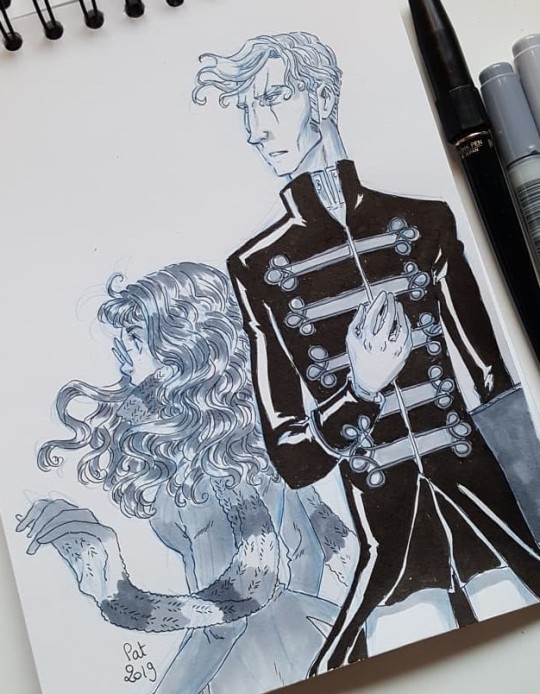
The Missing of Clairdelune is a superb second installment in The Mirror Visitor quartet. We get more of what we loved about the first book, more pieces to the larger existential puzzle, yet it smartly stops short of resolving too much so that we stay invested for the third episode. Christelle Dabos allows herself slightly more exposition. But the novel really succeeds by continuing to follow the less-is-more mantra and the showing vs. telling style.
As you may or may not recall, after I finished A Winter’s Promise, I spent an embarrassing amount of time copy/pasting excerpts from this book into Google Translate with the result that I really did spoil a lot of the OpheThorn parts for myself—which I don’t exactly regret. But, essentially, it left me with a bit less to say. I had a good response to my first OpheThorn analysis (it’s here and thank you for all the kind words), so I did think that I’d like to put something out about Clairdelune as well, I just wasn’t sure what. After some consideration (and a re-read), I do have some more thoughts about OpheThorn.
So, here we go.
[Spoilers included this time]
[All fanart images credited to @patricialyfoung]
Intro
Since Clairdelune begins right where Promise concluded, Ophelia is still pissed at Thorn, while Thorn is still pining for Ophelia albeit in his uniquely aloof way. The only real thing that’s made me scratch my head with them is the severity of Ophelia’s anger/resentment over Thorn having withheld his true ambitions from her and her finding out about them from someone else. I just think it’s a little bit of a weak conflict for them given how pragmatic they are. I get that it’s the culmination of a frustrating situation. But I still think it’s weak.
So, once again the two begin on shaky ground, a space they occupy for the bulk of the novel. They are, at least, together a bit more than before and there’s all sorts of lovely tension, mostly caused by Thorn’s inelegant method of wooing compounded by Ophelia’s stubborn refusal to give him an inch. Thorn’s growing feelings for Ophelia were subtly hinted at in Promise and they become more apparent here, particularly when juxtaposed against Ophelia’s stubborn denial of hers for him.
And I just adore the cover art! Don’t you?
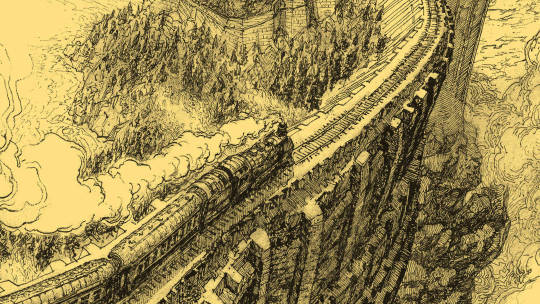
Thorn and Autism Spectrum Disorder
This is what I want to discuss. I may be alone in this, but it seems like Thorn could be coded as having autism spectrum disorder (ASD). It occurred to me while I was reading Promise and this time around, I feel comfortable in taking that perspective on Thorn. I like the notion of applying an ASD reading to his character because it explains a few descriptive quirks and makes him more than a “weirdo” or “freak”, which is reductive labeling. When considering his interactions with other characters and their reactions to him, this reading lends an added layer to his actions and overall development.
But let me make something clear.
This book isn’t about ASD, so I’m not suggesting that Dabos intended to write Thorn as having ASD or is trying to make a statement in any way on the disorder, and I’m cautious about how I use this idea to understand the character. This is purely my own speculation/take on the character.
I also want to be clear that I don’t have any personal experience with the disorder. I’ve met people with autism and ASD and they were all very different from each other and had very different needs. So, I’m largely making connections with textbook examples of ASD and they’re maybe a little bit broad because as I said it isn’t explicitly made clear that Thorn has ASD. I may very likely err in my understanding of this disorder. If that’s the case, I apologize in advance and please do correct me or give me your own opinion on this idea.
Here’s an overview from the webpage of the national institute of mental health:
Autism spectrum disorder (ASD) is a developmental disorder that affects communication and behavior. Although autism can be diagnosed at any age, it is said to be a “developmental disorder” because symptoms generally appear in the first two years of life. According to the Diagnostic and Statistical Manual of Mental Disorders (DSM-5), a guide created by the American Psychiatric Association used to diagnose mental disorders, people with ASD have:
Difficulty with communication and interaction with other people
Restricted interests and repetitive behaviors
Symptoms that hurt the person’s ability to function properly in school, work, and other areas of life
Autism is known as a “spectrum” disorder because there is wide variation in the type and severity of symptoms people experience. Although ASD can be a lifelong disorder, treatments and services can improve a person’s symptoms and ability to function.
It’s been shown repeatedly that it’s very difficult for Thorn to be an inviting and easy-going person, even with people he cares about. Thorn struggles with communication, is emotionally suppressed, is both uncaring and at times completely unaware of how he presents himself socially, and obsessively consults his pocket watch, particularly when he’s at a loss for words or bored, or otherwise ready to get the hell out of any situation that causes him anxiety. He’s highly intelligent, fixated on order and organization, and has a history (as we know from Promise and learn more about in Clairdelune) of meeting intense emotion with impulsive violence.
Here’s a list (also from the NIMH website) of common symptoms:
Making little or inconsistent eye contact
Tending not to look at or listen to people
Rarely sharing enjoyment of objects or activities by pointing or showing things to others
Failing to, or being slow to, respond to someone calling their name or to other verbal attempts to gain attention
Having difficulties with the back and forth of conversation
Often talking at length about a favorite subject without noticing that others are not interested or without giving others a chance to respond
Having facial expressions, movements, and gestures that do not match what is being said
Having an unusual tone of voice that may sound sing-song or flat and robot-like
Having trouble understanding another person’s point of view or being unable to predict or understand other people’s actions
Repeating certain behaviors or having unusual behaviors. For example, repeating words or phrases, a behavior called echolalia
Having a lasting intense interest in certain topics, such as numbers, details, or facts
Having overly focused interests, such as with moving objects or parts of objects
Getting upset by slight changes in a routine
Being more or less sensitive than other people to sensory input, such as light, noise, clothing, or temperature
People with ASD may also experience sleep problems and irritability. Although people with ASD experience many challenges, they may also have many strengths including:
Being able to learn things in detail and remember information for long periods of time
Being strong visual and auditory learners
Excelling in math, science, music, or art
One can’t help but notice that we can check several of these points off for Thorn. Not all, certainly, but I’m sure you can call to mind some of your own examples of him exhibiting many of these behaviors repeatedly.
Where Does Ophelia Fit In?
Thorn has always treated his relationship with Ophelia in a very business-like manner, almost like a negotiation, which makes sense within the context of an arranged marriage. At the novel’s start, Thorn wishes to make amends, but Ophelia makes it very clear that she will not forgive him for his lies and neglect. His response to her is rather clinical.
“We simply can’t allow ourselves to be enemies,” cut in Thorn. “You’re making my life difficult with your resentment; it’s imperative that we become reconciled. […] Meet me at the Treasury, insult me, slap me, smash a plate over my head if you feel like it, and then let’s never speak of it again. Name your day. This Thursday would suit me.” [65]
I suppose this is a rather annoying response, especially if one is really just looking for a simple and genuine apology. But if we read Thorn as having ASD, then this feels a little different. He’s simplifying a conflict that he maybe doesn’t quite understand; he’s been given a different perspective on his actions and it’s perhaps beyond his capability to comprehend. To compensate, he turns this into a matter of business, which is something he can understand quite well, even going so far as to try and pencil Ophelia into his calendar. But he’s woefully unaware of the frustrating effect his language and tone have on her. Of course, what’s key here is what he isn’t saying: that she’s making his life difficult because he loves her; he wants to be on good terms, but doesn’t know how to fix this. Note that he again suggests violence as a means to deal with her emotion.
When they do meet up, Thorn says,
“I have many enemies. I no longer want to count you among them, so tell me what I must do. That is why you came here, isn’t it? You have a deal to offer me, I’m listening to you.” [152]
He’s desperate. It’s also worth noting that he’s fairly vulnerable in this chapter; he exhibits jealousy and some hurt—Ophelia missed their original appointment because she was with Archibald and forgot about him.
Modest as always, Ophelia asks only for a job, money to pay Fox, her new assistant, and to see the real outdoors again. She lastly requests that he always be honest with her, especially in matters that directly concern her. In exchange, she will teach him how to Read objects after the ceremony of the Gift and he will teach her how to use the claws that he’ll pass to her. She also reiterates, for good measure, that this will be their only conjugal duty. He grants the first three readily enough, but the fourth one trips him up. He does agree to it, but it’s obvious that it will cost him in more ways than one.
While I imagine that he’s receptive on some level to sexual intimacy with Ophelia, I think he’s more afraid of intimacy in general. Sharing things and being honest with a partner means opening oneself up to vulnerability, to weakness. The undertaking he’s set for himself—a mission he’s already devoted 15 years of his life to—doesn’t allow for that kind of intimacy; rather, it requires utmost resiliency, secrecy, and focus. Furthermore, if he were to be seen forming loving attachments (with Berenilde, Ophelia, or anyone else), then that could be turned against him over the course of fulfilling his risky endeavor. It’s that very fear, in fact, which has made him exclude his aunt (and attempt to exclude Ophelia) entirely from his investigation. His pursuit of a noble title and legitimacy is a front, an easy excuse he thought up to satisfy Berenilde’s and the court’s curiosity about why he suddenly wanted to get married and Read Farouk’s Book.
Like Thorn, it scares Ophelia to feel herself falling in love. Perhaps the womanly pride she carries with her makes it difficult for her to open up. After all, love and marriage were never apparently high on her list of things to accomplish either. Ophelia and Thorn are separately dealing with the same conundrum, which is that to love means to fear, and that’s messy. It could get in the way of a life that is humble (Ophelia) and a life that is ambitious (Thorn). Simply put, neither one had accounted for even the possibility of love in their marriage.
Perhaps because Ophelia is a Reader, I think that deep down she likes the enigma and challenge that is Thorn. Yes, he’s frustrating, but she never truly loses interest in him. Indeed, if anything, she becomes increasingly intrigued and is entirely won over when she at last learns all about what he’s doing. Ophelia is very likely the first person to make Thorn both confront and attempt to correct his inadequacy in areas of intimacy. As I touched on in my previous analysis, Ophelia calling Thorn out on his behavior and habits is surely a novelty for him.
“I believe neither in luck nor in destiny,” he declared. “I trust only the science of probabilities. I have studied mathematical statistics, combinatorial analysis, mass function, and random variables, and they have never held any surprises for me. You don’t seem fully to grasp the destabilizing effect that someone like you can have on someone like me.” [377]
Ohhhhkay.
It turns out, she’s a bit of an enigma and definitely a challenge to him in kind. This is Thorn’s way of trying to tell Ophelia that he loves her.
Thorn and Ophelia seek control and wield it differently. Thorn can be arrogant and overconfident with it, and he wants to be its sole retainer. Ophelia also wants to retain it but as it pertains to her decisions for herself, and she rebels against it when she feels like that’s being taken away from her. It’s important to them that they are in control of their own actions and destinies. But what neither one of them understands is that those we end up loving is often (or maybe always) outside of our control. Love has no explanation, and doesn’t require one. You can’t predict it. You can’t dictate it. You can’t calculate it or quantify it.
Ophelia seriously turns Thorn’s life, and everything he thought he could predict or control about it, upside down. Initially unwittingly, then actively, she encourages him to develop.
ASD Made Sexy
As inelegant as he is, Thorn does have his own way of being shocking:
“You wanted me to be honest with you. You will thus learn that you are not just a pair of hands for me. And I don’t give a damn whether people find me suspect, as long as I am not so in your eyes. You will return this to me when I have kept all my promises,” he grumbled, holding his watch out to Ophelia without noticing her stunned expression. “And if you still doubt me in the future, just read it.” [156].
You guys, this is kind of romantic, right? He’s so direct and it really flusters Ophelia, who is steadfastly resisting the decidedly non-business-like turn their relationship has taken. Skip to novel’s end, however, and she has totally changed her tune about Thorn. Right before they believe they will be parted forever, Thorn finally gives a straightforward confirmation of his feelings.
“Don’t go falling down any more stairs, avoid sharp objects, and above all, above all, keep away from disreputable people, alright? […] Oh, and by the way, I love you.” [486]
Swoon.
The fact of the matter is this: despite his unconventional looks and mannerisms, Thorn hits a certain level of sexy. Which begs the question: Can ASD be sexy? Sure, one could say that his sex appeal comes naturally with his role as the male lead, which is directly connected to his chemistry with the female lead. But I think there’s actually an important distinction to be made; it’s not whether ASD itself is sexy, it’s whether a character with ASD is sexy and I think that’s important because you don’t want ASD to be treated as a gimmick in fiction. It matters how that kind of character is presented.
Thorn’s ASD traits make him eccentric at best and a “freak” at worst, by Ophelia’s own description. Some of Thorn’s less offensive eccentricities are portrayed in an endearing light: his brusqueness with silly persons (i.e. Archibald, Baron Melchior) and their silly behavior; wearing his heavy uniform in a tropical illusion when there’s no evident dress policy for officials; preoccupied with tending to the order of his office over the tending of his wounds; launching a dangerous existential investigation all because of an illegal and unjust disruption in odds and probabilities, an utter crime in Thorn’s eyes.
But it’s also important to look at how other characters view him. Those at the Pole may look down on him, but there is no doubt that he commands a considerable level of their respect. He’s at the center of Citaceleste’s political and economical arenas, and has some judicial power as well. In short, he’s the one that everyone seemingly runs to in a crisis. Ophelia begrudgingly admires his self-control, coolness under pressure, and appreciates that he is not corrupt, like the other officials and aristocrats. Naturally, Berenilde regards him the highest. She, more than any other, gives us a glimpse of the true Thorn, putting forward the image of a protector, provider, and all-around genius.
So, the answer is yes. Thorn is sexy.
Ophelia and Asexuality
OK, I realize I’m going off on a tangent here, but since asexuality is a common reading of Ophelia that I see in reviews, I wanted to address that as well.
There are many instances of Ophelia fulfilling, for lack of a better way to put it, the butterfly trope:
Perhaps it was due to the nervousness Thorn brought out in her, or the lace veil obscuring her vision, or the scarf coiled around her foot, or her pathological clumsiness, but the fact is, Ophelia tripped on the final step of the stairs. [28]
Hearing Thorn reawakened such nervousness in Ophelia that she seriously considered hanging up on him. [63]
She did, however, have to admit that Berenilde had got it right: it was indeed out of cowardice, more even than anger, that she’d spent recent weeks avoiding him. [100]
Somewhat embarrassed, Ophelia wondered whether he felt as nervous in her company as she felt in his. [160]
Ophelia felt her blood throbbing against her eardrums, but couldn’t have said whether it was due to sudden relief or, on the contrary, heightened tension. [323]
Ophelia gets butterflies whenever her love interest is near. It’s important to note that she’s not afraid for her safety when she’s with him, although there is one incident, where she thinks he’s going to strike her, which is quickly dispelled by his sincere assurance that he’d never harm her. He gives her butterflies often by doing totally mundane things such as standing in front of her or looking at her, and that bothers her. But why?
Like Thorn, she’s convinced herself that intimacy and love aren’t for her. Some reviewers have praised Ophelia for being a representation of asexuality and, while I think there’s a strong case for her being somewhere on the asexual spectrum, I stop short at positing that she’s totally uninterested in sex or doesn’t experience sexual attraction. She’s noted, on several occasions, both in Clairdelune and Promise, Archibald’s handsomeness. In this novel, she also notes Fox’s.
With his gold braiding and red mane, he was as dazzling as Thorn was dark. Ophelia sensed herself coloring just looking at him. [165]
So, she does experience sexual attraction and, furthermore, she physically reacts to Fox’s appearance (though never to Archibald’s), which suggests that she’s not wholly disinterested in sex. In Promise, she commented that “no man had ever quickened her pulse” and lamented about whether she’d ever feel that way about someone, and I think this is probably the point at which most readers took away that she might be asexual.
But, like...
Thorn is the only man who produces intense and consistent physical reactions in her.
Also, if you look at the [323] quote above, he did in fact get her pulse up. Just saying.
Rather than label her as purely asexual or even being on the spectrum, we could instead speculate that, as a Reader, she’s experienced to some degree love in all its forms through countless objects and perhaps she can’t help having this reaction to love and intimacy. I’m not trying to be cynical or pessimistic, but love can be treacherous and people are driven to do all kinds of terrible things for it or because of it. As wonderful as love is despite that, it seems likely that Ophelia has simply decided it’s not something she wants to navigate. Or she just hadn’t met someone yet who was worth all that trouble.
I’ll Close With This:
“You’re free,” whispered Ophelia. “Free to go, free to stay. I won’t make you leave one cage for another one, although, as you’ve seen, I really don’t live in great security. I decided your fate without taking time to think, or to speak to you. I was selfish…and I still am. […] I still am because, deep down, I would like you to choose to remain by my side. I know that apologizing can no longer change anything, but anyway: forgive me.” [135]
Ophelia says this to Fox after rescuing him from the dungeons of Clairdelune and taking him on as an assistant. Now, when I read this, I couldn’t help but think that it’s precisely the apology Ophelia wants to hear from Thorn. Yet, here she is, guilty of doing to someone the very thing she holds against him. Isn’t it funny how hypocrisy and love are such good friends? As we know, articulation and eloquence are not Thorn’s strengths and some of Ophelia’s aversion to him is based around her inability to accept this part of him.
Eventually, Thorn does make, more or less, the same apology.
“I should never have involved you in my affairs. I knew it would be dangerous. I convinced myself that I had the situation under control, and that mistake almost cost you your life. […] There is one thing that I have tried to tell you several times. I’m no good at these formalities, so let’s get on with it and speak no more of it. […] Please forgive me.” [444-45]
Strangely, she barely acknowledges this; she’s too busy having an epiphany.
At that second, she finally knew with absolute certainty where her place was. It wasn’t in the Pole, it wasn’t on Anima. It was precisely where she was now. At Thorn’s side. [445]
Well, perhaps this isn’t so strange since the novel starts off posing the question to this answer.
Deep down, Ophelia wondered where exactly her first home might be. Since she’d arrived at the Pole, she’d already visited Berenilde’s manor, the Clairdelune embassy, and her fiancés Treasury, and she hadn’t felt at home in any of them. [24]
The theme of home and belonging permeates this novel in a more central way than its predecessor. Ophelia is repeatedly confronted by it, but it’s also echoed in Farouk’s obsession with the Reading of his Book and finding out where he comes from and what happened in his past. When her family arrives from Anima, she sees the Pole and Thorn through their eyes. She ends up defending both from their disapproving remarks and in doing so, she realizes that she has ceased thinking of Anima as her home.
Life in the Pole was like that: wherever one went, whatever one did, danger was part of daily life. And yet, Ophelia reflected, she didn’t hate it that much, that life. [280]
Thorn’s apology seals the deal: she understands now that she was mistaken. Home is not a place. People, those who love you and who you love in return, give a home meaning. Belonging, likewise, is only made possible by the people who accept you and give you a place among them. It’s been hard-won, but she’s found both in the Pole, in Thorn and Berenilde. Her lack of a direct response to Thorn’s words suggests that she’s already forgiven him, that it matters less to her that he struggles with communication, that she’s finally accepted him for who he is and, better still, found him lovable despite that.
If we read Thorn as having ASD, then this intense dynamic between them is a positive treatment of mental/social disorders in fiction, which is really the only point I had to make with this entire thing.
Where Does Ophelia End?
I asked this question in my last analysis. Based off of the fact that, when we left her in Promise, she was experiencing some serious discomfort in body and soul directly connected to Thorn, I predicted/semi-already-knew that she would evolve toward him.
At one point, Ophelia loses the ability to pass through mirrors. We understand that it’s because she’s been lying to herself; after all, her great-uncle made it very clear that mirror-traveling is impossible under such a circumstance. It’s ironic because, by her own admission, she’s a “bad actress” [161] and, according to her mother, “was never any good at lying” [157].
She’s just so stubborn, isn’t she? It’s gratifying then to read when Ophelia overcomes it. Thorn makes a public announcement, cancelling his marriage, refusing to Read Farouk’s Book, and handing in his resignation as Treasurer. He does this to protect Ophelia and her family from imminent danger but at risk to his own welfare and position. He’s basically committing suicide, which very nearly turns literal at novel’s end. Ophelia can only think to go to him by the quickest means possible.
She looked straight at her determined face, beyond its scratches and bruises, finally ready to face that truth that she hadn’t wanted to see. It wasn’t Thorn who needed her. It was she who needed Thorn. Ophelia plunged, body and soul, into the mirror. [416]
I don’t think I need to spell that out.
Thorn and His Watch
To go on a little bit of a tangent, I also wanted to touch on the watch.
I believe it was mentioned in Promise that the watch had been a gift from Berenilde, which is so precious. Berenilde is the only true parental figure Thorn has known. She used her status and wealth to protect and care for him, and seems to understand him as only a mother--one with a child the rest of the world refuses to accept--can. I thought her reaction to Thorn’s suicidal announcement was especially devastating.
She had begun to shake so hard that Agatha rushed to take the baby from her arms. Bent double in her chair, as though punched in the stomach, Berenilde looked imploringly at Ophelia. “I beg you. Don’t abandon my boy.” [412]
Keep in mind that Berenilde has outlived her three biological children, none of whom survived past childhood. Thorn is such a lonely figure that it’s easy to forget he comes from somewhere. But Berenilde’s reminder to us is clear: he’s not the child of his Dragon father nor of his Chronicler mother. Thorn is her child, and she’s terrified of losing him like the others.
While there can be no doubt of her sentiment toward Thorn, it’s entirely likely that Berenilde foisted much of her maternal grief, trauma, and longing onto him without his express permission; he never seems to regard her with any particular filial warmth. Then again, he once attacked Archibald in defense of Berenilde’s honor, after he seduced her away from Farouk, and Ophelia later notes that he “suspended an investigation and jumped into an airship” to be near to Berenilde when she went into labor with her daughter [373]. Thorn is clearly defined rather more by his actions than his words. But the point is Berenilde is the one who gave Thorn his sense of belonging, and I just adore that.
Metaphorically speaking, the watch represents Thorn’s heart, which was given to him by his mother figure and which he gives to Ophelia as a token of his love and trustworthiness. Indeed, it’s even called a “mechanical heart” [156]. Ophelia has Read one of Thorn’s possessions before (dice) and was overwhelmed by the fury and breadth of his emotions. If she were to Read his watch, she’d probably die. Every time he digs it out of his pocket to look at it, to hold it, to fiddle with it, he’s engraving some emotional signature or trace onto it. Ophelia ultimately decides not to Read it.
“Before you go, I would like to return this to you. You need it more than me, and, in any case, I won’t read it. I’ve chosen to trust you—you, not your watch.” [285]
Her words have a profound effect on Thorn, rendering him totally speechless and maybe more confused than ever. At any rate, he misreads the situation and catches Ophelia off guard with an awkward kiss. It’s kind of a heartbreaking scene, because Ophelia simply reacts (by slapping him) and is genuinely baffled that he took her words for encouragement. I don’t necessarily take this to be evidence of her asexuality. I don’t discredit it by any means, but it just feels more like she was taken by surprise.
The thing is, for perhaps the first time ever in his life, he actively desired for someone to know his true heart and to trust in his sincerity, which is why he gave the watch to her in the first place. In his defense, this was quite a pretty and irresistible thing for Ophelia to tell him and I don’t think she’s as put off as she wants to be.
With ears burning and glasses crimson, Ophelia stared at the faded letters on the old wooden panel—“STAFF ONLY”—as if Thorn might, at any moment, retrace his steps, take back his kiss, and leave his fob watch with her, as she’d suggested in the first place. [286]
It’s funny. She wants to erase the uncomfortable physical side of the incident, but she also wants to retain his metaphorical heart. I mean, yes, it’s broken because of some careless action on her part and she asked for it back so her great-uncle could try to fix it. But still. It’s hard to ignore the metaphor there as well: if the heart watch has changed from beating to broken and she wants to hold onto the broken heart watch to try to mend it…
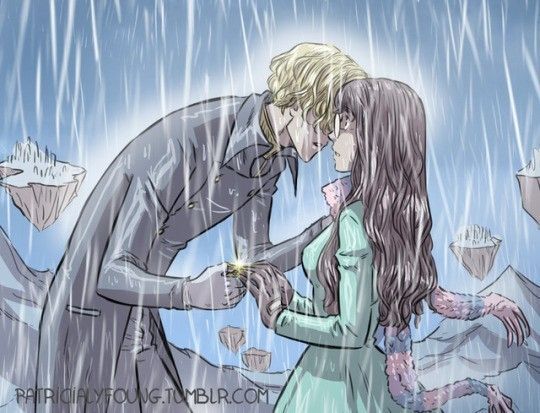
Well, good Lord, it’s just so obvious, isn’t it?
End
Well, that’s about it. As I said, I really only had the one main thought and then a bunch of smaller ones.
I just learned—and am seriously devastated—that The Memory of Babel won’t be released in the U.S. until May 2020. I’m hoping this is a tentative date and that it will be available sooner.
In the meantime, if someone could upload a PDF that I could then spend days plugging in to Google Translate (again), that’d be super greeeeaaaat…
For part III, head here.
#ophethorn#La Passe-Miroir#les disparus de clairdelune#the mirror visitor#the missing of clairdelune#christelle dabos#long book report
149 notes
·
View notes
Text
OpheThorn: A Rambling Analysis

A Winter’s Promise is the first novel in The Mirror Visitor quartet by French author Christelle Dabos. Although it was originally published in France in 2013, with the next two volumes having since been published, the English translation was only just released in September, with the second book due for a May release here in the States.
I praise it as a delightful concoction of originality, sprinkled with some J.K. Rowling, a dash of Philip Pullman, and a generous splash of Hayao Miyazaki. How smug was I when I read an old interview with Dabos wherein she cited all three as inspirations? Super smug.
I loved the whole thing, but the biggest takeaways for me were the protagonists, Ophelia and Thorn, both as individuals and as a pairing. I have so many thoughts! So, I’m hoping/waiting for there to be more of an English fanbase for this book.
Until then, here’s a super-long essay of my impressions. If I’m at all difficult to follow in regards to the source material, then I guess you’d best get out there and get a copy!
[All fanart images used credited to @patricialyfoung]
Intro
A Winter’s Promise is a helluva introduction novel. It offers intrigues galore: in plot and setting; in magic and myth; in characters and relationships. It is so heavy on this theme, some readers might actually deem the novel tedious, slow, or even cyclical. I describe it as nuanced; nothing is ever really stated outright. I think that’s intentional and I think it’s a smart, effective move: it’s never a good idea to overexpose an imaginary world.
I will reserve final judgment until I’ve finished her series, but at this point I think that Christelle Dabos is extremely skilled in the art of layered storytelling and in the rarer “showing vs. telling” writing style. As stated, despite being invested in the captivating world-building, I was most drawn to the central characters and their absorbing slow-burn chemistry. Although they can’t boast of having a connection that leaps off the pages, I found them to be two of the strongest, most compelling points of this novel.
[I use a plethora of quotes and block quotes, but my ebook edition was not formatted with page numbers. Therefore, I’ve used chapter titles for reference.]

Character Sketch: Ophelia
Ophelia is a petite, bushy-haired archivist/historian from the southern ark, Anima. She is never described as beautiful, nor even pretty, and often suffers sneezing attacks, nose bleeds, and a perpetual runny nose. All Animists have the ability to influence objects that are normally inanimate in addition to having a separate magical ability unique to them. Ophelia is what is known as a Reader—in making contact with any object (excluding organic matter and raw materials), she can absorb its memories and the emotions of the people who previously owned or handled it. She wears special gloves to prevent her from Reading at random and, thus, tarnishing the object’s historical value and integrity. She can also travel through mirrors, which is a rare gift among Animists.
She is often characterized by two objects that are always on her person: on the verge of blindness, Ophelia wears spectacles that change tint and color depending on her moods; the other is a striped animate scarf that exhibits the endearing traits of a protective pet. She has been raised with a certain amount of independence, abhors idleness, and is a museum curator, though it’s not a paid position. Although Anima is matriarchal, there does exist a societal expectation for women to marry sooner rather than later and to be a credit to their family through marriage, if nothing else. Ophelia has, up to this point, evaded that particular expectation.
I believe that her age range is 18-20. It’s mentioned that both her mother and older sister married at the ages of 15 and 17 respectively, which appears to be the normal age range for Animist women to marry since they give Ophelia a hard time for failing to have been married by either age.
Character Sketch: Thorn
Thorn is part of the aristocratic class from the northern ark, the Pole. Taciturn, brutal, and grave, he is also repeatedly described as thin and uncommonly tall, standing two full heads above Ophelia. He is never described as handsome and has a heavily scarred, unsmiling visage. Like Anima, the residents of the Pole have magical abilities. Unlike Anima, where there is no apparent class system and everyone is united as one enormous family with a myriad range of useful abilities, the classist society of the Pole is segregated into clans, each clan distinguished by a singular ability. Thorn belongs to the Dragon clan; he has the power to telepathically attack the nervous system and draw bodily wounds with invisible “claws”. He also has an astoundingly expansive memory.
Thorn suffers social ostracism as much from the illegitimate status of his birth as his misanthropic demeanor, if not more. Nonetheless, his relentless ambition has resulted in a rise to power as the steward of the Citaceleste, the floating capital city, and the rest of the provinces of the Pole. He is heavily characterized by one object: a pocket watch, which he constantly consults for its practical purpose or as a nervous tick, or both. The Pole is patriarchal and appears to follow traditional patriarchal customs. Women who exhibit too much independence are not highly regarded.
Thorn is older than Ophelia, probably in his mid-20s, possibly late-20s.
At this point, I feel I should also explain the gendered arks.
Each ark has a “family spirit” who is basically an all-powerful guardian ancestor from whom all inhabitants of an ark are descended. Some are more central than others. For example, the Pole is overseen by Lord Farouk who, despite an effeminate countenance, is a bit of a masculine stereotype in that he gathers about him beautiful women or “favorites” and lives for idleness. Aristocratic society revolves solely around Farouk. Anima, on the other hand, is overseen by Artemis, Farouk’s sister, who is less available to her descendants, less of a fixture in their lives, preferring a solitary, scholarly existence in her observatory. So, in a technical sense, the Pole is a patriarchy and Anima is a matriarchy, although neither ark strictly adheres to every bullet point definition of those societies. Woven throughout the novel are hints of an existential crisis involving the family spirits, God, and the breaking of the Earth, which resulted in the semi-diasporic arks.
Common & Opposing Traits
Something I find interesting about Ophelia and Thorn is that they actually share several core traits. The most immediately recognizable common trait is their underdeveloped sociability and how they use it to their advantage. Ophelia is quiet but not shy; rather, she hides behind this perception of herself as a defense. Thorn, on the other hand, uses his reticence to intimidate. It’s worth noting that while neither present any illusions to the world, they also do not reveal much. They allow those around them to draw their own conclusions, whether correct or not. They are also highly pragmatic and are not much given to idealism, particularly where their arrangement is concerned.
Their most important commonality, in my opinion, is their strength of will. In “The Kitchen”, we are offered a hint of Ophelia’s will power when her great-uncle and mentor says:
“To read an object requires forgetting oneself a little, to leave room for the past of someone else. Traveling through mirrors, that requires facing up to oneself. One has to have guts, y’know, to look oneself straight in the peepers, see oneself as one really is, plunge into one’s own reflection. Those who close their eyes, those who lie to themselves, those who see themselves as better than they are, they could never do it. So, believe me, it’s no run-of-the-mill thing.”
And:
“Of your mother’s whole brood, you’re the one who’s never shed a tear, never howled, and yet I swear, you were definitely the one who got into the most scrapes. […] Since you were born, you’ve never stopped hurting yourself, making mistakes, falling flat on your face, pinching your fingers, getting lost. […] You have the strongest character in the family, my child. Forget what I said to you last time. Here, before you, I predict that your husband’s will is going to shatter against yours.”
This is clear foreshadowing of Ophelia’s character and I like what her great-uncle says here because it’s actually an abstract summary of what Ophelia ends up going through over the course of the novel.
Thorn’s strength of will is a little bit trickier to discuss without giving away significant plot details. Suffice it to say, Thorn has a risky, ulterior scheme in mind. The success of his plot depends on his ability to juggle many things in the air and to keep juggling when Ophelia enters his life, threatening to distract him.
As far as opposing traits go, well, they are fairly stark. Perhaps the most noteworthy is Ophelia’s unpredictability: she’s headstrong and impulsive and will not be controlled. She’s not outwardly rebellious or defiant, but she questions and constantly evaluates the goings on around her, and sometimes cannot keep her curiosity in check, which leads to trouble. Thorn, meanwhile, is methodical and punctilious, which makes him predictable. He is never transparent; while he, too, is inquisitive, he’s much stealthier when it comes to seeking answers. What is left to be seen is whether each might learn from the other and make a fair trade of these traits.
For sure, they’re not without flaws (I, for one, think Dabos is pretty unforgiving when it comes to outlining their flaws) and it’s true that Ophelia is less nuanced than Thorn because she’s our main protagonist and has yet to commit any behavior worthy of deep analysis. But my absolute favorite thing about them is that their characterization as a couple is nuanced.
The Arranged Marriage
Before we segue into said nuance, I want to cover my thoughts about the arranged marriage aspect of OpheThorn.
I may be mistaken in this, but outside of historical fiction, I feel that it’s somewhat rare to find arranged marriage being explored in any significant way. Here, I don’t know that there’s a particular stance being taken on it; it’s presented neither positively, nor really negatively, and that’s probably because the arrangement is a key plot device, not a romantic trope.
Arranged marriage here is more or less reminiscent of its real-world counterpart. Though not evidently an uncommon practice, it does seem to be unusual to both Anima and the Pole that a family would be looking outside of its ark for a candidate. Indeed, Thorn and his aunt Berenilde go to great lengths to conceal Ophelia’s presence at the Pole, both for their own reasons and reasons which would suggest that foreigners are not entirely welcome. Likewise, Animists seem to have a poor opinion of the “barbarians” at the Pole.
Ophelia is already on thin ice with her family; this is actually her third or fourth marriage prospect, but it is by far the most distinguished and important as it will establish/reinforce a diplomatic alliance between arks. She is a reluctant participant, but feels optionless: basically, if she turns this particular proposal down, her family will disown her, strip her of her position at the museum, and her life as she knows it will be at an end. Therefore, Ophelia has coped with her powerlessness in the matter by looking at it in a positive light: as a purely diplomatic alliance to strengthen ties between the arks. At the same time, she rejects entirely the possibility of love as well as the ickier “broodmare” reproductive connotation. She also fully expects to continue working in some way despite knowing that it’s unusual for women of Pole’s aristocratic class to have occupations.
Tracking OpheThorn
For me, the most likeable part of OpheThorn, in this first novel, is its slowness. One reason for this is because they don’t actually spend much time together: Dabos keeps them apart for what probably amounts to two-thirds of the book. But there is oh so much to unpack in those brief interactions. The unique and lovely thing about the pairing is that they’re just as apparent in the unspoken as the spoken. Overall, it feels organic and in keeping with their respective characterizations. There may not be a lot of growth happening, but what little does occur is significant. In short, there’s a lot of groundwork being laid for a slow-burn romance, my favorite.
So, let’s track OpheThorn!
[The following are points that generated my thoughts the most, but there’s definitely others.]
The Spoken/Stated Evidence
Ophelia and Thorn don’t have much of a meet-cute.
Like, at all.
He’s surly, rude, and forbidding; she’s reticent, reluctant, and a bit of a blank slate. Within 24 hours of meeting, Ophelia embarks on an airship, her first ever journey away from home, with a stranger who shows no interest in her. Things don’t look great, but Ophelia is made of stern stuff. Take, for example, this passage. Bidden by her aunt Rosaline, her appointed chaperone for the duration of her engagement, to build a rapport with her fiancée, Ophelia unenthusiastically goes to visit Thorn’s airship cabin, bearing a sort of white flag in the form of a tea tray. The chat doesn’t go super well and ends on this note:
“The more I see of you, the more my first impression is reinforced,” he grumbled. “Too sickly, too slow, too pampered… You’re not cut out for the place I’m taking you to. If you follow me there, you won’t last through winter. Just you wait and see.”
Ophelia held the look he was boring into her. A look of iron. A look of defiance. Her great-uncle’s words resounded in her memory and she heard herself replying to him: “You don’t know me, sir.” (The Warning)
Ophelia has got some steel in her after all, just like her great-uncle said! Ophelia may not succeed, she may not survive, but she’s got the spirit to try and that counts for more than people often give it credit. Quite quickly, Thorn learns this about Ophelia.
After weeks of being kept under what basically amounts to house arrest (recall, Thorn and Berenilde wish to conceal Ophelia’s presence as long as possible before the wedding), Ophelia puts into action a plan she’s conceived to escape the manor and do a little covert exploring on her own. Foolish, maybe; ballsy, for sure, especially considering the fact that Ophelia feels ill at ease on the mysterious, sinister Pole. She finds some stuff out, but inevitably she gets lost and runs into a bit of trouble as well: Thorn’s malicious half-sister, Freya, who escorts her home and then attacks her for good measure. Ophelia’s absence is duly noted and she is away long enough for Thorn to be alerted and arrive at his aunt’s estate before she makes it back. Thorn is not pleased:
“Your warnings were just words to me. I needed to see your world with my own eyes.”
“With whose collusion did you get out?”
“That of your back door. I tamed it.”
“Who assaulted you and for what reason?”
“Only your sister, Freya, whose path I crossed by chance. She doesn’t seem to approve of our marriage.”
“Half sister,” Thorn corrected. “She hates me. I’m amazed you survived that encounter.”
“I hope you’re not too disappointed.”
“You’ve just made a public spectacle of yourself. All we can hope is that Freya holds her tongue and doesn’t target us with any unpleasant repercussions. In the meantime, I would advise you to keep a low profile forthwith.”
Ophelia pushed her glasses back up her nose. From the way Thorn had been carrying out his questioning, she’d thought him very detached. She’d been wrong: this incident had deeply angered him. “It’s your fault,” she murmured. “You’re not preparing me adequately for this world by keeping me in ignorance.”
She saw Thorn’s fingers tighten around his watch. Berenilde’s return to the room distracted his attention. (The Sister)
As you can see, I kept only the dialogue here. (To make this essay somehow shorter, I guess???)
Ophelia quietly shows that she’s not as meek and submissive as people (including Thorn) think she is. Because of that fact, Thorn decides his presence at the manor is necessary in order to help his aunt keep a closer eye on Ophelia. At that point, Ophelia senses a change in his opinion of her:
She had the impression, maybe a misleading one, that he was no longer as hostile towards her as he had been. That didn’t necessarily make him amiable—he was just as morose—but the atmosphere was less tense. Was that due to their last conversation? Had Thorn taken into consideration what she’d told him? (The Claws)
In this chapter, Ophelia asks him a lot of questions, which I won’t reveal here. The point is that Thorn actually gives her answers for once. Ophelia, if nothing else, is a truth-seeker and she can sense that the truth is being obscured from her, even more so now that she’s on the Pole, surrounded by false impressions and trickery. Even if they’re often sparsely worded, Thorn’s explanations are so frank and unsoftened as to be credible.It’s more than what she gets out of anyone else and what she needs even if the answer is intimidating:
“You’re afraid? That’s not like you.”
Ophelia looked up at Thorn in surprise, but her neck protested and she had to lower her head again. The brief glimpse she’d caught of him, however, left her thoughtful. Those razor-blade eyes watched her from on high and from a distance, but it wasn’t really condescension. Rather, a remote curiosity, as though this little fiancée was turning out to be less uninteresting than expected. Ophelia couldn’t stop herself from feeling annoyed. “How can you claim to know what’s like me or isn’t? You’ve never made the effort to try to get to know me.”
To that, Thorn didn’t respond. (The Claws)
I love Ophelia. Girl is so not passive.
Being called out is something that Thorn is probably not accustomed to. After all, he’s an authority figure with power in both his professional and personal life. He is a top official in the Pole’s political hierarchy and none but the boldest of his ruthless family members have the nerve to cross him. His aunt, even, is wont to fuss over him, due in all likeliness to the hard circumstances of his illegitimate birth, but he keeps her at arm’s length—their relationship resembles that of a sullen teenage son and profligate socialite mother. At any rate, Thorn has apparently thought of Ophelia enough to consider her fearless, which (as she correctly points out) is a bit of an uninformed opinion on his part. Essentially, Ophelia’s persistence with the engagement coupled with her striking out unattended in his world, a world even he is wary of, has greatly impressed Thorn.
This is hinted at in their next exchange, wherein Thorn makes her quite a speech. Lord Farouk sends his ambassador, the mischievous Archibald (whom Ophelia met on her escapade and with whom Berenilde has a past and Thorn a grudge), to order Berenilde back to court and Thorn back to work. Since they can’t leave the Animists behind unattended, it’s decided that Ophelia will take on the role and disguise of a manservant called Mime and Rosaline will act as a lady’s companion to Berenilde. Thorn comes to inform her of the move and confesses some other, rather surprising things:
“I’m not very talkative,” he said, finally. “I’ve always considered speaking a waste of time, but, as I hope you will have noticed, I do try to counter my nature. And you’re not a chatterbox, either,” he went on in his excessively hard accent. “If that was a relief to me at first, I’ll confess that your silences are now more wont to bother me. I’m not pretending to think you’re happy, but, basically, I haven’t the slightest notion of your opinion of me. You were right, the other day. I haven’t taken enough time either to get to know you or to allow you to get to know me in return. It’s not something I do often, making concessions, but…I admit I should have had a different attitude towards you. You must think I’m throwing you into the lions’ den with total indifference. I don’t show it to you very well, but your fate is of real concern to me. If the slightest offense is committed against you behind my back, it will be paid for at the highest price.” (Mime)
Again, I’ve condensed the narrative here.
This marks the first significant turning point in their relationship. Ophelia’s natural inquisitiveness has made her increasingly skeptical in her new environment (for good reason) and she spends a lot of time internalizing the things Thorn tells her. This is no exception and, while she remains wary, she is speechless:
She had been ready for anything except this statement. What she thought of him? Since when had he cared about that? He didn’t even trust her (Mime).
This is a way forward, after all. Ophelia fully expected to remain at odds with Thorn, sustained by his remoteness. But here he is, trying to make amends in an effort to be considerate. It throws her off, but also intrigues her.
Trust is the main conflict between Ophelia and Thorn. She thinks he’s hiding things from her and, well, he is. But she thinks it comes from a place of doubt and condescension. While that may have initially driven him, the fact that he has an ulterior goal becomes apparent; details are vague, but it’s definitely portended to be risky. He probably feels like he has no choice but to keep Ophelia out of the loop. I would posit that his gradual realization that she is capable and not easily cowed are a few reasons why he decides to open up to her. Though he remains cagey, he does so in order to protect her, both for his peace of mind and a little bit for her sake, because he now knows that she will not be controlled and it could get her into trouble. So, he’s kind of in a difficult position: how and what to reveal, and when, while also not polarizing her (because now he cares about her) or jeopardizing his plans, which include her cooperation.
Neither one really knows what to do with this foreign attraction to someone. The most Thorn reveals of his true feelings is to say, “I think I’m starting to get used to you” (The Treasury). Ophelia interprets this to be an admittance of him falling in love with her, or liking her at least. She is high-key shocked. Remember, she can’t Read people with her power, so this really is quite shocking: clearly, by this point, Ophelia is confident in her ability to read the unreadable Thorn, and this is what she comes up with? Uh, wow!
For the most part, Ophelia has too much on her plate to spare a lot of time for reflection on her fiancee; she’s too busy simply trying to get from one day to the next. Yet, when she is able to take a moment to think of Thorn, it’s always with some sort of emotional turmoil: she is angered, saddened, feels guilty and confused. She always tries to think of him with indifference, always appears to be put off by his misanthropy, tries to convince herself that she can make the best of her situation without his devotion.
Why, then, go to the trouble of trying to interpret him at all?
She very often notes his bodily quirks and behavioral ticks, using them to form somewhat accurate readings of him in a situation when he’s being particularly aloof (which is basically all the time). Even if it is sort of related to her calling as an archivist, it’s obvious that she’s quite attuned to him. She could only have been able to discern that he’s in love with her if she too cared in some measure for Thorn, or at least their relationship.
So, that leads us to here, the major evidence which shows just how much the relationship grows over the course of this novel:
The timeline of A Winter’s Promise is about 8 months. In this world, it is custom for an inter-ark arranged engagement to last a full year, with one spending the entire engagement with their betrothed on the ark on which they will live. In “The Kitchen”, Ophelia and her family learn this leave-taking will occur days ahead of schedule: within 24 hours of his arrival on Anima, Thorn announces that his duties back on the Pole make it impossible for him to linger—they will leave that very day. What results is an interesting moment of defiance from Ophelia, where she challenges Thorn to break the engagement:
“Go home then, sir, as duty calls. I’m not stopping you.” Her lips had moved of their own accord. It was but a barely audible whisper, partly due to her cold, but it had the effect of a thunderbolt in the kitchen. […] Her attention was focused on Thorn, who, for the first time since they’d met was studying her closely, straight on, from top to bottom. His lanky legs had jerked him straight up off his stool, like a spring being released. […] Ophelia expected an explosion.
The response was but a deep murmur: “Is this a refusal?”
At first, I thought he was outraged too. But he’s not. In this moment, he’s actually hopeful that she will renounce him right there. This is worth mentioning because eventually Ophelia does renounce him, but at a point when he doesn’t want her to. For the entire novel, she has kept her true thoughts from him, on both the marriage and him. In “The Station”, however, she is finally honest:
“I’m grateful to you for wanting to watch over me, and I thank you for the support you’ve given me. But there is one thing you need to know about me. I don’t love you.”
Thorn just stood there, arms dangling, for several long seconds. His face was totally expressionless. When he did finally move, it was to tug on the chain of his watch, as if the time was suddenly of utmost importance.
“Is it due to something I’ve said to you...or haven’t said to you?��� Thorn had asked this stiffly, without taking his eyes off his watch.
“It’s not your fault,” she whispered in a tiny voice. “I’m marrying you because I wasn’t given any other choice, but I feel nothing for you. I won’t share your bed, I won’t give you children. I’m very sorry,” she whispered even more quietly, “but your aunt hasn’t chosen the right person for you.”
The problem, which Ophelia is unaware of, is that it’s too late:
“Do you have any idea of the fate reserved for betrayers here? Do you think you just have to present your excuses to me and my aunt, and then go back home? You’re not on Anima here. [...] What you’ve just said to me, repeat it to no one, if you value your life. We’ll marry, as agreed, and after that, well, it will be only our business. [...] You don’t want me? Let’s not mention it again. You don’t want brats? Perfect, I detest them. There’ll be plenty of tongues wagging behind our backs, and so what.”
As Ophelia notes, Thorn “accepted her conditions, as humiliating as they were, to save her life”, though doing so clearly does not align with his own feelings. She thinks he’s acting out of obligation and he is, but because he cares about her, not because he’s noble. Sound familiar? An awkward proposal born from an honest regard, but mistaken for some over-blown sense of obligation, being instantly rebuffed... It’s one of the most common romantic literary tropes. Think Jane Eyre, North and South, Pride and Prejudice, even Wuthering Heights and Gone with the Wind or Anne of Green Gables. So many!
But if there was such a threatening consequence, why didn’t Thorn tell Ophelia about it all the way back in “The Kitchen”?
[UNAVOIDABLE SPOILER WARNING] At the Pole, if two people with different powers marry, they can enact a ceremonial trading of powers. If the couple does not marry, but there are offspring, their combined powers can manifest in them, which is how Thorn has both his father’s Dragon clan power and his Chronicler mother’s power of heightened memory. Thorn needs a Reader’s ability in order to enact his overarching plan to investigate the family spirits, God, and the breaking of the world. True, the Reader didn’t necessarily have to be Ophelia but they did need to be female so that Thorn’s investigation could be disguised by a political marriage. Therefore, since Ophelia is known to be the best female Reader among her clan, her selection as Thorn’s bride wasn’t mischance. [304] [END WARNING]
The poor first impression Ophelia gave was enough to convince Thorn that she was unfit for the task ahead of her. Since he went far out of his way to be offensive to her and her family (i.e. his unconcealed disdain, abrupt change in departure plans, last-ditch effort on the airship to scare Ophelia off), I would posit that Thorn didn’t ever think it necessary to reveal the danger in leaving Anima; he probably thought he could repulse Ophelia and her family enough to end the betrothal, return to the Pole alone, and try to find a different candidate.
Therefore, he was hopeful in “The Kitchen”, which indicates that he does actually feel compassion and doesn’t want to cause unnecessary distress, contrary to Ophelia’s impression of him. He was also trying to save himself from having to face the consequences of breaking a betrothal since the consequences are much more severe in the Pole than they are on Anima.
All this to say that at the beginning of the novel, Thorn was covertly trying to spare Ophelia a life-change albeit from a selfish state of mind. By the end of the novel, however, he has unexpectedly been changed by her. From a selfless state of mind, Thorn accepts her wishes without protest, at the cost of his own, in order to protect her from another life-change (which, interestingly, she deems worse than the other) and whatever punishment traitors to the Pole are subject to.
I think as well that this interaction demonstrates the fact that Thorn is a secret feminist. It’s a detail that becomes even more apparent after this point. For example, as a widow and the on again/off again favorite of Farouk, Berenilde enjoys a certain amount of independence, which Thorn has been shown to be both supportive and protective of. Indeed, if not for that independence, he might have had a very different life since she was the one who raised him and tried to blanket his bastard label with her noble one.
Furthermore, after Berenilde tells Ophelia, “you are in no position to have an opinion. Your only opinions will be those dictated to you by my nephew”, Thorn cuts her with, “be quiet. It so happens that her opinion does have importance” (The Angel). Bear in mind, this chapter comes after Ophelia’s rejection of him. Is it love that drives him to still defend her and regard her well? Though at odds by novel’s end, there remains this sense that Thorn will continue to support Ophelia and strive to do the right thing by her despite her distance.
I get heavy North and South vibes from them.
But if Thorn evolves toward Ophelia, where does Ophelia end? In a state of emotional, mental, and bodily turmoil:
“I don’t love you.”
She’d said it. Never would she have thought that such simple words could trigger such a stomachache. Her rib seemed to be crushing her very insides. (The Illusion)
More heavy foreshadowing that Ophelia is changing, too, and will choose Thorn, eventually.
The Unspoken Evidence, a.k.a. All the Looking
With two such unforthcoming main characters as Ophelia and Thorn, there’s a lot to be gleaned from their unspoken moments. Thorn mostly communicates via looks, stares, bodily ticks, which as mentioned, Ophelia quickly begins to decipher. Here are some samples, in chronological chapter order:
His eyes, tapered like flashes of metal, didn’t alight for a second on the young lady he was supposed to be courting. (The Bear)
He didn’t look back once to check that his fiancée was still actually there. (The Gamekeeper)
She glanced surreptitiously at Thorn, feeling uncomfortable with him just in front of her, but he was paying more attention to his plate than to all those at the table put together. (The Dragon)
These ones exemplify Thorn’s indifference to Ophelia at the beginning of the book. The next ones, though, occur after the turning point when Ophelia called him out about not properly preparing her for the Citaceleste.
With his elbows on the desk, Thorn was looking sharply at her; she wondered for how long those metallic eyes had been dissecting her in that way. (The Claws)
Thorn’s eyes, like two slivers of metal, shone strangely in the light of the desk lamp. Each time they were turned to Ophelia, as they were now, she felt as though they were trying to penetrate her very soul. (The Treasury)
When she reached the sofa, she saw that Thorn’s pale eyes, blade-like flashes against a dark background, were following her every move. (The Trust)
And these next excerpts occur after she deduces that he’s in love with her:
She’d only just noticed the sharp look Thorn was giving her from the box of honor. Seen from another part of the set, no one would have noticed the slight difference in the angle of his look, or doubted, therefore, that it was directed entirely at his aunt. However, from where Ophelia was standing, at the end of her gondola, she could clearly see that it was [her] he was staring at like that, without the slightest embarrassment. (The Opera)
Thorn was watching her now with the intensity of a bird of prey. (The Station)
Thorn didn’t take his eyes off Ophelia. Concentrate as she might on drying a teapot, she could still sense him out of the corner of her glasses. (The Angel)
I might find it a bit creepy of Thorn that he expresses himself this way. But, again, it speaks both to his gradual attraction to Ophelia as well as her increasing awareness that things have changed between them. It’s really Thorn’s only means of expression since Ophelia has cut off most of his spoken efforts. I also wonder if there’s some reason that Dabos continually emphasizes the description of his eyes. Is it attraction on Ophelia’s part? Or just the primary means through which she reads him so succinctly, windows to his soul and all that?
Where is it Leading?
So, I cheated and found a French pdf copy of the second book that someone had uploaded and also found uploaded quotes from the the third book. This is how obsessed I am: I spent hours locating as many OpheThorn references as I could by copying and pasting portions and entire chapters into Google Translate.
Suffice it to say, what happens in those books make what happen in this one all the more interesting.
The reason OpheThorn resonates so much with me is because it’s different. Sure, it hits some common romantic tropes; enemies to lovers, for one. But I really like that Ophelia and Thorn don’t lose their individual qualities when they’re together. Something I find that happens a lot in YA romance is that a character described as taciturn, like Thorn, will suddenly start exhibiting warmer traits for no discernible reason; they’ll even start speaking differently. It’s meant, I suppose, to drive home the point that this character has evolved, because of the other character, yet there’s been no proof of that actually happening. As I’ve just tried to prove, I think Dabos did a tremendous job at really showing us how Thorn and Ophelia are still changing, in ways respective to their characterization. With that in mind, and considering the fact that it’s a forced marriage, it stands to reason that OpheThorn is going to be rather unsentimental overall.
I absolutely love an unsentimental romance.
It’s tangible, carries more weight, heightens the drama. Readers expecting and/or desirous of a more openly compassionate, straight-forward love story will likely be repelled. But I have a feeling the pay-off will be really satisfying.
Want More? OK!
When I was reading the book for the first time, I could pinpoint the moments when I fell in love with Ophelia and Thorn respectively.
For Ophelia:
“I want something tough,” he said to Ophelia. “You wouldn’t have a weapon? A war thing, you know.”
Ophelia replaced the drawer and took the key she needed. The wars of the old world fired up the imagination of the young, who had only experienced minor family quarrels. All these greenhorns were after was having fun. Mockery of her little self didn’t bother her, but she wouldn’t tolerate anyone showing so little consideration for her museum, today of all days. She was determined to remain professional to the end, however.
“Please follow me,” she said, key in hand.
“Submit your samples to me!” trilled Bowler Hat, with an exaggerated bow.
She popped her key into the lock of a display cabinet, slid back the glass panel, and, with a handkerchief, picked up a tiny lead ball, which she handed to Bowler Hat. “An excellent starting point towards a better understanding of the wars of the old world,” she stated flatly. He burst out laughing as he snatched the ball with his bare hand. “What’s this you’re offering me? An automaton’s dropping?”
His smile gradually faded as, with the tips of his fingers, he went back into the object’s past. He became pale and still, as though time had frozen around him. Seeing the look on his face, his beaming companions started poking him in the ribs, but became concerned when he didn’t react. “You’ve given him something horrid!” said one of them in a panicky voice.
“It’s an item highly prized by historians,” countered Ophelia in a professional tone.
From pallid, Bowler Hat turned to gray. “It’s not…what I…was asking for,” he struggled to get out.
With her handkerchief, Ophelia retrieved the lead ball and replaced it on its little red cushion. “You wanted a weapon, didn’t you? I gave you the projectile from a cartridge that, in its time, punctured the stomach of a soldier. That’s what war was about,” she concluded, pushing her glasses back up her nose. “Men who killed and men who were killed.” (The Journal)
This occurs near the beginning, while we’re getting to know Ophelia.
At some point, Ophelia read the bullet herself, experiencing the same thing as the ignorant and arrogant amateur Reader. But her reaction is to feel a deep respect for this object and what it has to tell, despite its trauma and horror. A Reader, like her, can live many lives and experience many emotions. It has probably led to a keener than average sense of people--and their motives.
Ophelia knew this would be a shock to the boy and “not what he was asking for.” But she also knew that he didn’t know what he was asking for; she enlightened him but kept it professional, and even felt a bit sorry for him. We can surmise that Ophelia’s experience as a Reader has hardened her mentally and emotionally, though not to the point of losing her compassion and empathy, as she presumably has also read objects with happier, more noble stories. It is a subtle indication that she is actually more prepared for life in the treacherous Pole than she, or anyone else for that matter, could know.
In retrospect, the line in bold is also a key. In life, most things can be broken into the binary: “kill or be killed”, “eat or be eaten”, “do or don’t”. It’s a survival/preservation reference, right, and it eventually applies to Ophelia’s situation in the Pole. What is interesting is that she kind of turns her back on the binary and forges her own way. I love her.
And for Thorn:
“Someone definitely did poison those oranges…with the aim of harming me, not Madam Hildegarde.”
“You seem to have a very precise idea on the matter,” observed Thorn.
“It was your grandmother. I read it by touching the basket of oranges,” she continued. Ophelia watched for a flicker of emotion in Thorn’s metallic eyes—surprise, denial, incomprehension—but he seemed to have turned into marble.
“She detests everything I represent,” she insisted, hoping to convince him. “A parvenu, a cause of shame, tainted blood. She doesn’t want me dead, she wants to discredit me publicly. [...] I said nothing about it to your aunt. I’ve no idea whether or not she suspects the two-faced behavior of her mother. First, I wanted to know what you felt about it,” she concluded, her voice fading.
Thorn finally moved again. He unlinked his fingers, sat up straight in his chair, thereby gaining height, and consulted his fob watch. Ophelia was flabbergasted. Did he not take her seriously? Did he think he was wasting time with her?
“You want to know what I feel?” he said at last, not taking his eyes from his watch.
“Please.” Ophelia was almost imploring him. Thorn wound his watch, put it back in his uniform pocket, and, totally unpredictably, violently swept everything off his desk with his arm. Quill-holders, ink pots, blotters, letters, even the telephone, were all sent spinning to the floor with a deafening clatter. Ophelia gripped the armrests of her chair with both hands to stop herself from running away. It was the first time she’d seen Thorn succumbing to an outburst of violence. And yet, with his elbows on the desk, hands pressed together, finger to finger, Thorn didn’t seem at all like someone who had recently been angered.
“I’m pretty annoyed,” said Thorn. “Somewhat more than that, even.” (The Trust)
Note that this chapter chronologically comes after the one in which Ophelia realizes that he’s in love with her. Thorn’s “thing” is to be enigmatic to a fault, so it was a little harder to pinpoint where exactly he gave me pause for thought.
Actions always speak louder than words, right? Thorn is repeatedly shown to be very ordered, very neat and sparse. He does not create chaos in any way; rather, he repels it. For him to be driven to wreak havoc, in his personal space, on account of Ophelia, is a pretty clear indication of the hold she’s taken over him. It’s unpredictable behavior, which tips us off to the fact that not everything is as it seems with him. It also hits a common romantic trope, where one half of a pairing (usually the male) goes Super Extra after finding out the other was threatened, injured, or otherwise harmed in some way. Barring all that, it’s also just an incredibly funny moment, startling, inadvertent, comically-timed.
Fin
Thanks for sticking it out! If you wanna chat about the book (or give me more spoilers, French readers), you’re welcome to send me a message!
Click here for Part II!
#ophethorn#la passe-miroir#les fiances de l'hiver#christelle dabos#a winter's promise#the mirror visitor#slow burn romance#slow burn chemistry#long book report
334 notes
·
View notes
Text
Have you seen this???
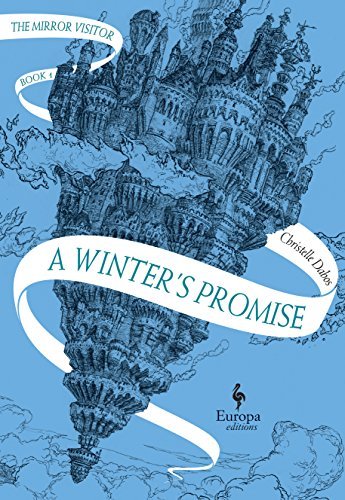
You Guys! This Book! For Real!
Plain-spoken, headstrong Ophelia cares little about appearances. Her ability to read the past of objects is unmatched in all of Anima and, what’s more, she possesses the ability to travel through mirrors, a skill passed down to her from previous generations. Her idyllic life is disrupted, however, when she is promised in marriage to Thorn, a taciturn and influential member of a distant clan. Ophelia must leave all she knows behind and follow her fiancé to Citaceleste, the capital of a cold, icy ark known as the Pole, where danger lurks around every corner and nobody can be trusted. There, in the presence of her inscrutable future husband, Ophelia slowly realizes that she is a pawn in a political game that will have far-reaching ramifications not only for her but for her entire world.
Wait, I’m gonna start by addressing two recurring critiques I saw on Amazon.
It seems that those who gave it a lower rating did so because A) they were disturbed by the abuse and neglect the main character suffers through most of the plot and that B) said plot was slow.
First of all, if reading about abuse is triggering for you or just really not your cup of tea, that's one thing and completely fair. Don’t give it a try.
But these reviews, as is typical of Amazon, are so misleading. While the main character, Ophelia (and several other characters, for that matter), certainly suffers abuse and neglect, some people seem to be fixating on the fact that abuse and neglect exist at all, painting a "bleak" picture. What bothers me is that they cry about abuse, but totally ignore the victim’s ultimate response to it. We should be paying attention to how victims overcome their suffering, and what Ophelia discovers are some of the core values of feminism. It’s a terrific takeaway, particularly for female readers, but really all readers of any age and gender.
Criticism B can be taken as a trade-off: basic, slow-moving plot-line in exchange for total immersion. Trust me, it’s a satisfying trade.
Anyway.
I thoroughly enjoyed my time with this novel. I was so intrigued and occupied that I flew through it in two days, and I felt the nearly foreign urge to immediately restart the story in order to better savor the details.
Things I Want to Talk About
Comparisons
To break it down, I would say Dabos’s style is a delightful mix of the murky magic of Dianna Wynne Jones; the quirky prose of J.K. Rowling; the dark pragmatism of Phillip Pullman; and, lastly, the fantastical atmosphere of Hiyao Miyazaki. It’s a really good cocktail, but it is definitely particular. So, I would caution those looking for something more mainstream, in style and substance.
World-Building
In a word, it is stellar.
For me, what makes it stand out from other fantasy novels is that the characters know their world. So many fantasy novels follow a common formula where the reader and the protagonist learn about the latter’s powers and world simultaneously, or the protagonist has to explain everything, usually in 1st person, so it feels jarringly unnatural. Not so here. All of the characters are familiar to some extent with various aspects of their broken-up, semi-diasporic world: the arks, the people who live on those arks, the powers attached to those arks, etc.
As far as we need be concerned, things just Are, everyone already Is, without over-exposition, which is a tricky but essential quality, particularly where magic is the key component of a story.
Character Development
At this point in the series, I would call it characterization more than development because there isn’t so much growth happening as there is unfolding layers. The best example is, naturally, Ophelia. Some of the Amazon reviewers criticize her lack of strength or find her too timid—but that’s sort of the point. Every character in the book underestimates her and the reader, I think, is supposed to feel that way too. And yet, through every adversity, she keeps moving forward, without tears or self-pity or defeat, but with resolve. I’m not sure where certain readers overlooked that point, or if they simply forgot that this is the first book in a four-novel series and things won’t just happen all at once.
But Ophelia is, like, every bookworm ever who was called shy and timid just because she was quiet and observant. And as is so often the case with “shy” people, she’s anything but. Ophelia isn’t like the outwardly assertive #strong woman heroine over-saturating the YA market right now (which, trust me, I appreciate as much as the next). But she does find more mettle in her than she thought, she can take pride in being able to face herself in a mirror and accept herself for who she is, and she’s loyal to her principles, even when that means things might end up being the worse for her. #strong woman indeed.
The other standout is Thorn, obviously, because he is frightfully enigmatic at all times, there’s weight to every scene he’s in, and you’re never, ever sure what he’s up to, if his motives are honest, if his intentions are good, all bad, sorta bad. I also really appreciate that we, as readers, cannot (yet) rely on him or his political power to protect Ophelia from the traps around her. We learn, as Ophelia does, that ultimately she must be her own savior.
Ambiguity
This is not a straight-forward love story! I don’t know if it will even become a love story, but there’s heaps of foreshadowing to that end and it definitely follows the enemies-to-lovers trope. A straight-forward love story really is out of the question where ever an arranged marriage is concerned, which isn’t to say that there isn’t or won’t be a developing romance. It’s simply more subtle and non-conventional. But there is undeniably a slow, slow burning chemistry between Ophelia and Thorn. His anti-social behavior and her indifference are what make their relationship deliciously difficult to categorize, at this point.
Lastly
My only real criticism is that the translation is shaky in some parts and I really wished I was even the slightest bit familiar with French. The best way I can describe the narrative, which is already being told in 3rd person, is that at times it’s like you’re being held at arm’s length and I can’t tell if that’s down to the translation or if that’s how it was written by Dabos.
Anyway, go read it! 2nd book comes out in English in May!
#the mirror visitor quartet#a winters promise#book review#ophethorn#les fiances de l'hiver#la passe-miroir
60 notes
·
View notes
Text
SPOILER

AAAAAAAHHHHHH!
139 notes
·
View notes
Link
Listen on iTunes/Listen on SoundCloud/Listen on Stitcher
In this episode, Rachael and Kirsty discuss:
An intriguing Rumi quote Vic Mahoney has recorded on the wall of her office
The announcement of Star Wars: Galaxy of Adventures
Stephen Schiff joins Cassian Andor series as showrunner
The latest episode of Star Wars: Resistance, ‘The Platform Classic’
In the spotlight section, we discuss the Rey and Kylo threads of the sequel trilogy so far (with an emphasis on the former) in relation to the observations on female journeys made in the seminal book of feminist literary analysis, The Madwoman in the Attic. In particular, we look at the parallels that emerge with two classic works of literature - Wuthering Heights and Jane Eyre.
Send any questions for the podcast to [email protected] - if your question strikes our fancy, we may discuss it in the next show!
Don’t forget to like us on Facebook and give us a follow on Twitter @ScavengersHoard!
As always, many thanks to @nemling for the beautiful art and Miranda for the music!
108 notes
·
View notes
Photo
Oooo
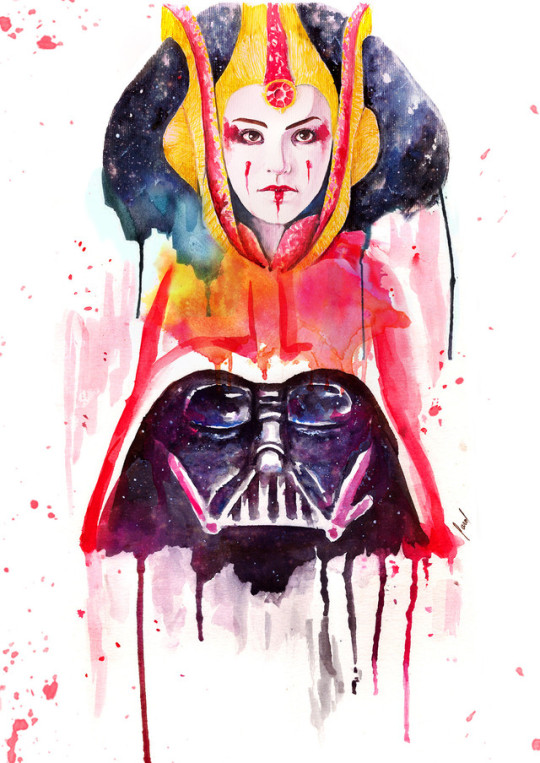
Amidala and Vader | by Caroline Vieira
856 notes
·
View notes
Text
Hey, everyone! Look at what my sissy did!
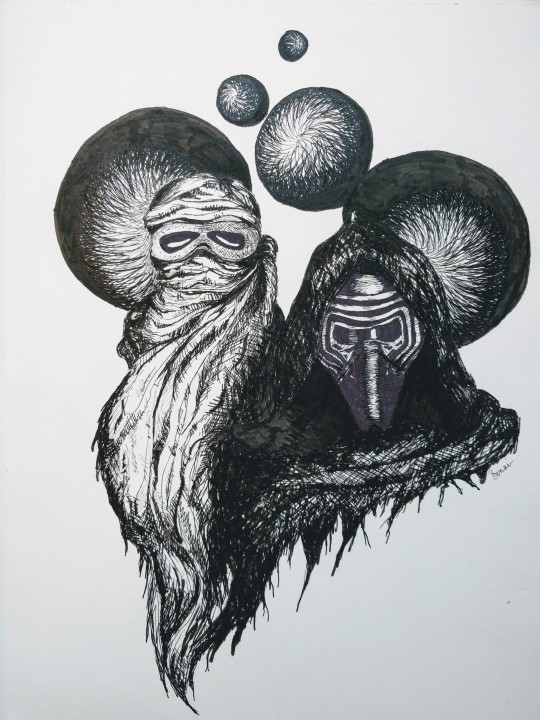
Hey-o! Look who’s joining the inktober crowd on the last day just because of the prompt (“mask”). [PS. If you steal this, I kill you].
174 notes
·
View notes
Text
Hi everyone, you should read Strange the Dreamer and Muse of Nightmares because:
magic. lots of kinds.
mythic creatures
cool world-building, lots of history
lots of conflicting feelings
good bad guys
no like really, there isn’t a single person who doesn’t do bad things
but you will still love them all
some really good thoughts about the weight we place on future generations
romance
and some tender sexy times
you will cry
truly kind characters
lgbtq characters
each section starts with a word (made up) and a definition and it kinda describes the plot, and will fill you with dread
but in a good way
the importance of forgiving
because the world is so much more complex than it seems
books and libraries are important
80 pages into the first book I was cheering
no one is irredeemable
and I think that’s an important message considering tumblr culture
Um just read it
This has been a PSA from me to you, Muse of Nightmares comes out on October 2nd, you’re welcome.
#strange the dreamer#muse of nightmares#laini taylor#food for thought kind of books#lingers after you finish kind of books
566 notes
·
View notes
Text
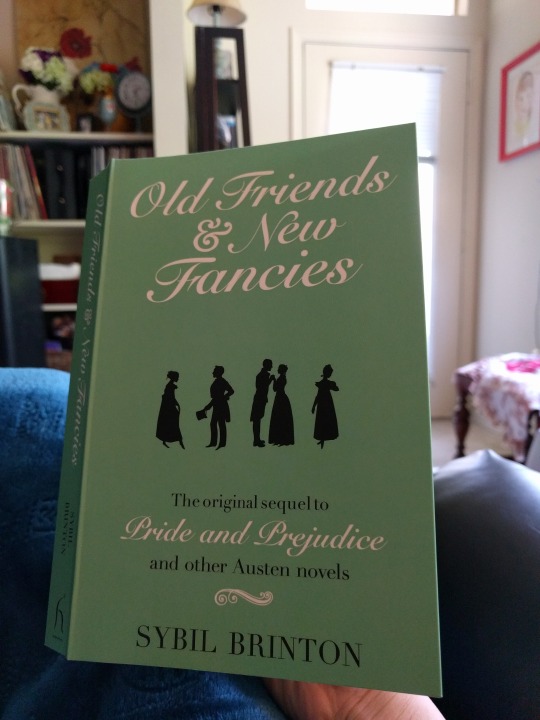
Have any Austenites heard of this book?
I just discovered it at a local used bookstore. Published in 1914, it really is just what it says on the cover: it's more or less a continuation of Pride and Prejudice insofar as Elizabeth and Darcy are the main protagonists. But it interweaves characters, both major and minor, from Austen's 5 other novels as well; it's a bit like a who-knows-whom, which makes perfect sense since Bath is a common fixture in several novels, and I wonder why the BBC hasn't yet thought to either adapt this novel and/or create an original show with a similar set-up.
Anyway, it's quite good so far. More true to Austen's style and subjects than any contemporary sequels I've tried.
#pride and prejudice#persuasion#sense and sensibility#emma#northanger abbey#mansfield park#austen sequel#jane austen#book recommendation
23 notes
·
View notes

